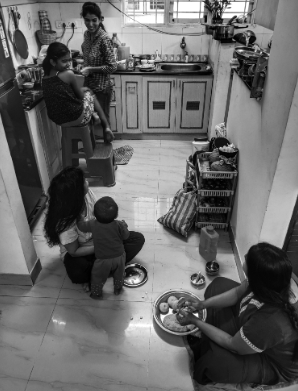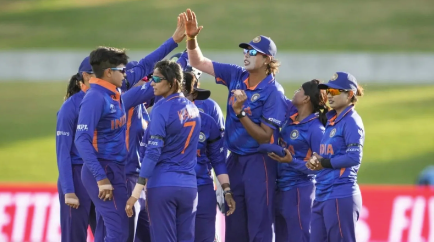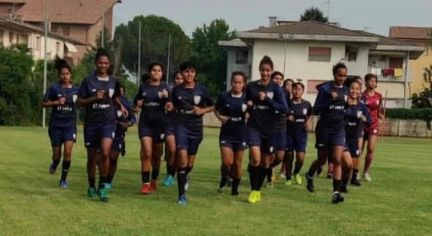
Surabhi Yadav/women_at_leisure
Sometimes they eat mangoes, in other places they chit-chat while cutting grass. Some lie on cool floors on hot summer days as they scroll through their phones, others have their hair oiled. There’s napping. A lot of it.
What does women’s leisure look like? When Surabhi Yadav got on to Instagram in 2018 it was with one short objective: To really get to know her mother, Basanti who had died of liver disease in 2013 when Surabhi was 23. “Beyond being a housewife and a mother, who was she? I hadn’t really known her as a person,” she said.
The early answers threw up some surprises. “Naughty” and “goofy” were how neighbours described her to her daughter who had only seen her as a disciplinarian with four children. During Holi she would do some raunchy role play. When women gathered in the courtyard every day from 5.30 to 7 pm to unwind, it was her mother who took it upon herself to make the others laugh.
She had studied only until the 8th grade, but in the afternoons would practice writing.
“I began to see my mother in such a different light,” said Surabhi, an engineer from IIT, Delhi who now runs a non-profit, Sajhe Sapne that helps rural women launch careers in a modern labour market.
Gradually, Women at Leisure expanded to the larger question of women’s identity. What are the different dimensions to their lives? How do they use their time?
“When we talk of gender equality we talk of equality of access to resources—money, property and rights,” said Surabhi. “But we don’t see how caste, class and community has an impact on women’s time. We don’t talk about time as a feminist issue.”
Men’s time v women’s time

We actually have a pretty good idea of how differently men and women use their time.
The 2019 Time Use Survey carried out by the National Statistical Office establishes that women spend an inordinate (and lopsided compared to men) amount of time on housework – cooking, cleaning, caring for children, the elderly and the sick.
Across India, men spend on average an hour-and-a-half (97 minutes to be precise) a day on unpaid care work, which is the more accurate term for housework. Women by contrast spend nearly five hours, or 299 minutes, a day on this work.
That’s a gender gap of nearly four hours on unpaid care work.
Anecdotally, we know that the burden of unpaid care work shot up during the pandemic with families home from work and school. But, economist Ashwini Deshpande has documented how for the first few weeks after the lockdown, men did step up to help out with the housework.
But by August 2020, once the lockdown restrictions had eased up, average male hours spent on unpaid care work also fell – though not to pre-pandemic levels.
Perhaps gender norms are not as ingrained as we’d like to believe they are, Deshpande said.
The cost of unpaid care work

Needless to add, housework has no financial renumeration. No days off. No labour regulations. Yet, women who carry out its wearying, unrelenting demands often describe themselves as ‘not working’. until 2021.
Obviously, the more time that a woman spends on unpaid care work in the house, the less time she has for paid work outside the house. No surprises then that women’s workforce participation in India is amongst the lowest in the world, at par with Yemen and barely above Saudi Arabia.
Leisure for most is a luxury – and for women who work inside and outside the house, a dream.
This is where Surabhi Yadav’s project brings in a quiet element of subversion. Because its images are so mundane and so taken-for-granted when done by men, they appear as radical simply because they are done by women.
When women put their guards down; when they aren’t being mothers and wives and daughters but just themselves, it opens up a world of possibility.
“If all our mothers sang and danced and wrote the poetry, which is in their heads, what would our world look like?” asked Surabhi.
It would be a world of greater diversity, more opinions and views, newer ideas.
Women’s leisure, of course for themselves, but also for a better world.
See Surabhi Yadav’s project on Instagram at women_at_leisure
If you had more time for leisure, how would you spend it? Write to me at: namita.bhandare@gmail.com. I’d love to hear from you.
GOING PLACES

It has taken 232 years and 115 prior appointments for a black woman to raise her right hand and take oath as a judge of the Supreme Court. Ketanji Brown Jackson was administered the judicial oath, appropriately enough by Stephen Bryer who has retired and who she replaces. She is now her country’s first black Supreme Court justice.

GENDER TRACKER

With 1.64 billion video views, the ICC Women’s World Cup 2022 in New Zealand is the most viewed women’s cricket competition in history. It is also the third-most viewed ICC event of all time, after the ICC Men’s Cricket World Cup, 2019 and the ICC Men’s T20 World Cup, 2021.
Source: https://www.icc-cricket.com/news/2656309/
EYE-ROLL

“The women are our mothers, sisters, we respect them a lot. When their sons are in the gathering, it means they are also involved, in a way, in the gathering.”
Afghanistan acting deputy prime minister Abdul Salam Hanafi has said no women will attend a gathering of religious scholars and tribal elders, the first such to be organised by the Taliban.
STORIES YOU MAY HAVE MISSED
Number theory

Recently released Periodic Labour Force Survey (PLFS) data confirms what we’ve suspected for a long time about the low levels of women’s workforce participation rates. An analysis by Abhishek Jha and Roshan Kishore finds that 43% of unemployed women, and only 1.5% of unemployed men, said they weren’t in paid work due to housework constraints, including childcare. The gendered burden of housework does not exempt India’s most educated women with 65.9% postgraduates and above saying that household responsibilities prevented them from seeking paid work.
Sexual misconduct in Indian sport

In what is the third case of sexual misconduct in Indian sport in recent times, an assistant coach of the under-17 women’s football team has been suspended pending investigation of allegations of misconduct with a player that surfaced during the team’s ongoing trip to Norway.
Earlier, a woman cyclist had accused a national coach of inappropriate behaviour while training at Slovenia and woman sailor said a coach had made her uncomfortable during a foreign tour.
Lack of injuries, resistance doesn’t mean consent
Patna high court judge A.M. Badar has ruled that consent cannot be presumed just because a rape survivor doesn’t fight back or have injuries on her body. The judge was hearing an appeal against the verdict of a lower court that convicted a brick kiln owner of raping a woman labourer after she demanded her wages.
FIELD NOTES
Testing the waters: Young women’s work and mobile aspirations in smaller cities
There’s a tendency to look at big cities as spaces where women can find a certain degree of freedom, particularly if they are migrating from small towns. But what about smaller towns themselves?
Drawing on pre-pandemic fieldwork with employed youth aged between 15 and 29 in Mangalore and Kishangarh, this study led by Mukta Naik of the Centre for Policy Research looks at young women’s work, education, aspirations and mobility in smaller cities. It finds that for women from villages and small towns, smaller cities do present opportunities for mobility that push against patriarchal boundaries as women use a range of strategies from individual power tactics within households to leveraging institutional support systems.
The study finds that migrant friendly policy initiatives in small cities can potentially improve employment and mobility outcomes for young women.
Read the paper here.
SHABAASH, BENGALURU AIRPORT
The handle @appadappajappa tweeted a photograph of the men’s washroom at Bengaluru airport complete with a diaper change station. “Childcare is not just a woman’s Responsibility,” she tweeted. We couldn’t agree more.
AROUND THE WORLD

Leaving nothing to chance, France’s parliament voiced support for a bill enshrining abortion rights in its constitution.
A Florida court provided a last-minute reprieve from the state’s proposed 15-week abortion ban from taking effect, saying it violates the privacy protections.
Pride Month came to a tragic end with a deadly attack in Oslo that left two people dead and 21 others injured. While police advised the cancellation of scheduled events, thousands turned up for an LFBTQI rally outside the capital’s city hall to pay tribute to the victims of the attack.
And finally, the long arm of the law has caught up with two sex offenders. R&B singer R. Kelly has been sentenced to 30 years in jail for sex trafficking and racketeering. And one-time British socialite Ghislaine Maxwell received a 20-year-prison term for her role in conspiring with dodgy financer Jeffrey Epstein to traffic and sexually exploit and abuse underage girls.
| Were you forwarded this email? Did you stumble upon it online? Sign up here. |
| That’s it for this week. If you have a tip or information on gender-related developments that you would like to share write to me at: namita.bhandare@gmail.com. |
